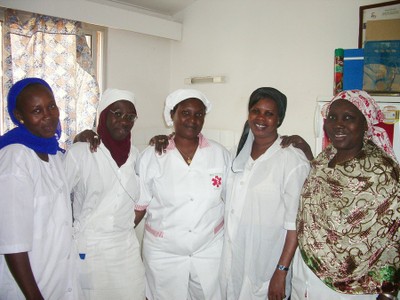Senegal – SOS Medical and Social Centres
In Senegal there are currently five Social Centres and one Medical Centre for children and the local community, including one in Kaolack. Many SOS Social Centres operate via Family Strengthening Programmes, which aim to support the wider community. Medical Centres provide treatments and services to the wider community. Below is some information about some of the Centres that SOS Children runs in Senegal:
SOS Medical Centre in Senegal: In-Depth
 Kaolack
Kaolack
Description of SOS Medical Centre:
In March 1984, an SOS Medical Centre was opened, which includes a maternity and paediatric department, in order to ensure medical care for the people and to implement preventive measures at a local level. It has several departments: general medicine, paediatrics, maternity, a dispensary, a laboratory, a room with ten beds and an administration area. Since the centre opened, up to 18,000 patients have been seen there each year.
Work and Achievements:
For twenty-four years now (24), the Medical Centre of SOS Children’s Village Senegal has been expanding while developing its activities with regard to the provision of health care to populations together with the other structures of the health district.
The statistics for 2009 are as follows: 20,010 patients admitted against 20,000 in 2008.
Patient details: 20,010 divided into:
- Adults (women) = 11,327
- Adults (men) = 2,078
- SOS Village boys = 281
- SOS Village girls = 225
- Day patients (boys) = 3,201
- Day patients (girls) = 2,796
- SOS Family Strengthening Programme = 102 cases
SOS Social Centres around Senegal: In-Depth
Tambacounda
Work and Achievements:
Since the programme was initiated in 2008, the school entry percentage in the programmes catchment area has risen from 6% to 56%. The agricultural production increased thanks to our agriculture called “Produce More to Live Better”
253 Children, 70 adults including parents (fathers and mothers/) and 183 close relatives (uncles, aunts, cousins/female cousins, nephews/ nieces etc.) benefit from the Programme. However, only parents benefit from the health support.
Ziguinchor
Description of SOS Social Centre/FSP:
It started in March 2007 and increased its accommodation capacity in September 2009 with the admission of 184 new children (95 boys and 89 girls) divided into 38 families with 42 women and 18 men.
Work and Achievements:
The FSP has now 401 children divided into 81 families including 218 boys and 183 girls. The number of adults is 123 including 84 women and 39 men.
Activities achieved:
Provision of food: monthly food assistance comprised of rice, oil and sugar granted to each family to make sure they have 3 quality meals a day.
Health: The access to health care is ensured. Children are now spontaneously taken to health structures as soon as the first symptoms of the disease appear.
Education: In 2008-2008, 150 schoolchildren were enrolled to formal education and 107 (71.33%) moved up to next grade. Out of 5 children undergoing apprenticeship, 4 (80%) moved up to next grade.
Capacity building for families
Awareness-raising, chat and social mobilisation sessions are organised on hygiene, health, sanitation and civil status to better care for children’s needs.
An adult literacy course in Mandingo with 40 listeners is open for a 6-months period for the new families.
The former beneficiaries contracted a second micro-credit loan and are operating in the retail trade sector, market-gardening, cattle breeding, etc. Their savings totalled 1,300,000 FCFA. The new families are going to start their activities shortly.
Kaolack
Description of SOS Social Centre/FSP:
An SOS Social Centre has been operating since August 2005 within the framework of the programme to improve the living conditions of children from needy families. It has been added to the SOS Medical Centre and can provide care for up to 178 children and 46 adults. The centre offers assistance to those from the neighbourhood so as to enable them to improve their living conditions: it supports them whilst they are looking for work or when setting up a small business, and provides them with medication and food. These supportive measures are intended to prevent problems associated with the dire social situation, such as prostitution, insufficient education and drug abuse.

 Return to Schools Wikipedia Home page…
Return to Schools Wikipedia Home page…
